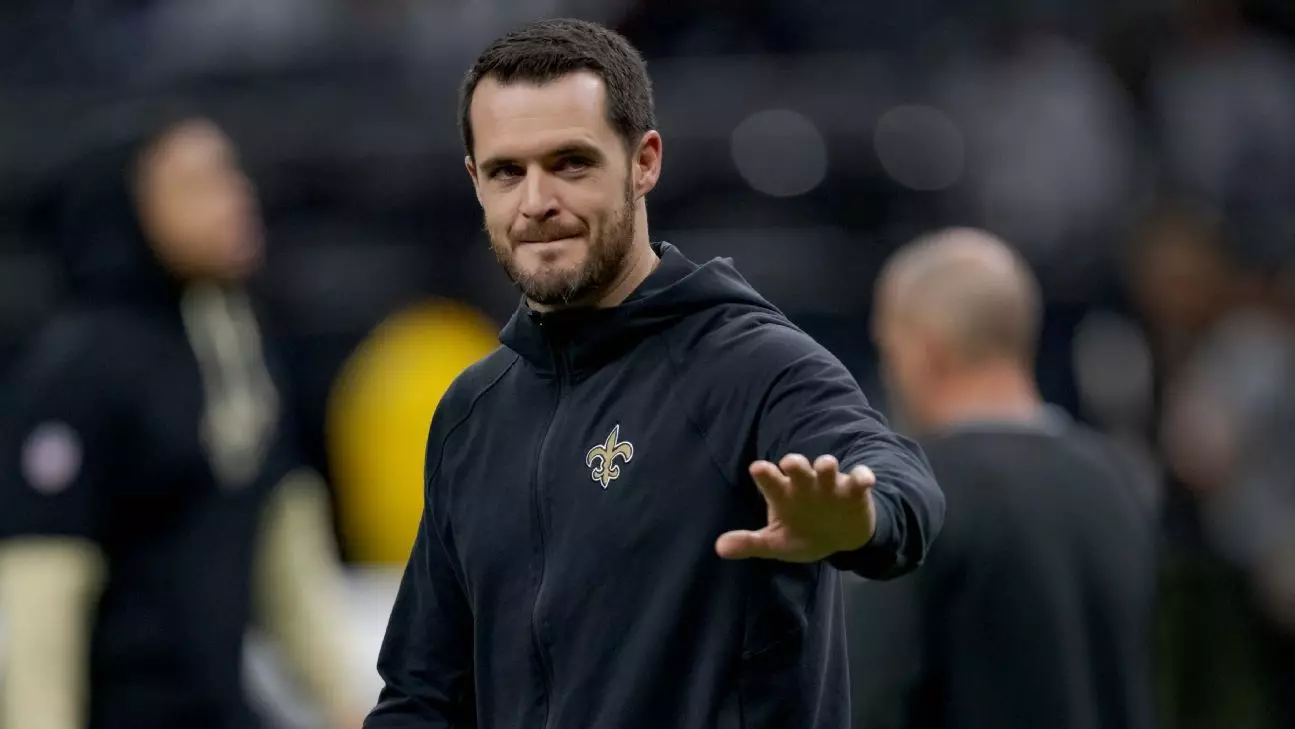The New Orleans Saints have faced a tumultuous season filled with hopes, challenges, and a revolving door of player injuries. The latest headline involves quarterback Derek Carr, whose chances of returning were dashed after suffering a fracture in his non-throwing hand during a game against the New York Giants on December 8. This injury not only sidelines Carr for the pivotal matchup against the Tampa Bay Buccaneers but also raises questions about the implications for the team’s future and Carr’s role within it.
The Unfolding Drama of Carr’s Injury
As news broke regarding Carr’s injury, interim head coach Darren Rizzi consistently pushed back against the narrative that Carr’s season had reached its abrupt conclusion. Rizzi expressed frustration over the pervasive reports following the injury, emphasizing Carr’s dedication and efforts in rehabilitation. “At no point in the rehab process was there ever a ‘I’m done for the year’,” Rizzi insisted, pointing to Carr’s daily commitment as he fought to regain full functionality. This unwavering dedication and positive mindset are common among professional athletes, who often possess an intrinsic motivation to compete regardless of physical limitations.
However, the palpable optimism within the Saints’ organization did little to alter the reality of Carr’s physical capabilities. Week after week, attempts to simulate a game scenario fell short. Rizzi had hoped to see Carr back on the field for the critical matchups, especially against the Raiders, a personal rivalry for Carr. Unfortunately, while the Saints tried various methods, including injecting Carr’s hand with pain relief, the option of rushing him back was ultimately dismissed. The coaching staff’s lingering hopes could not outweigh the stark truth of the injury’s impact.
The ramifications of Carr’s injury extend beyond just the quarterback position. As the Saints navigate their final games of the season, they also face uncertainties around other key players. Running back Alvin Kamara is listed as doubtful due to a groin injury, and receiver Chris Olave’s status remains questionable following multiple concussions. The cumulative effect of these injuries on team performance cannot be understated. For a franchise aiming to make a playoff push, such key player absences at a critical juncture hinder the team’s chances for success.
Rizzi’s comments point toward a broader examination of the Saints’ strategies and the team’s resilience in the face of adversity. The growing list of injuries has forced the coaching staff to adjust gameplay and strategies, relying on players who may not have expected significant playing time. The upcoming game against the Buccaneers was meant to serve not only as a clash between rivals but also as a litmus test for the team’s depth and adaptability.
While Carr’s absence is felt palpably, attention turns to the future of the quarterback position for the Saints. Will Carr return for another season, or will this culminate in a reevaluation of the franchise’s direction? Such decisions will likely depend on several factors, including Carr’s health, performance when fit, and how the front office views the roster moving forward. The coaching staff must now consider not only Carr’s immediate recovery but also how his long-term health influences the team’s strategy.
In the larger context of the NFL, similar stories unfold every season; teams grapple with injuries, roster adjustments, and the quest for sustained performance. The importance of depth in coaching, as well as player adaptability, often becomes a deciding factor in a team’s success—or lack thereof. As the New Orleans Saints trek through this difficult period, all eyes will be on how they respond not just to the immediate challenges but how they lay the groundwork for their future ambitions. The days ahead are crucial: will they rise to the occasion, or will the weight of injuries define the closing chapter of their season?

